 13 citations,
June 2018 in “Dermatopathology”
13 citations,
June 2018 in “Dermatopathology” A new classification system for skin cysts was proposed to improve diagnosis.
 13 citations,
January 2018 in “Cellular Physiology and Biochemistry”
13 citations,
January 2018 in “Cellular Physiology and Biochemistry” Fat-derived stem cells can help protect and repair skin stem cells from aging caused by UV light.
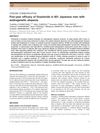 13 citations,
July 2015 in “Journal of Dermatology”
13 citations,
July 2015 in “Journal of Dermatology” Finasteride effectively promotes hair growth and reduces hair loss in men with androgenetic alopecia.
 12 citations,
December 2018 in “Clinical Ophthalmology”
12 citations,
December 2018 in “Clinical Ophthalmology” Latanoprostene bunod effectively lowers eye pressure and is better tolerated than other glaucoma medications.
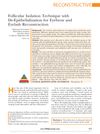 12 citations,
September 2012 in “Plastic and Reconstructive Surgery”
12 citations,
September 2012 in “Plastic and Reconstructive Surgery” Adding de-epithelialization to the follicular isolation technique improves hair transplant results for eyebrows and eyelashes.
 11 citations,
January 2016 in “The Journal of Sexual Medicine”
11 citations,
January 2016 in “The Journal of Sexual Medicine” Young women with nonclassic congenital adrenal hyperplasia may experience worse sexual function and mild depression compared to healthy women.
 11 citations,
January 2013 in “Methods in molecular biology”
11 citations,
January 2013 in “Methods in molecular biology” The method allows for 3D tracking of hair follicle stem cells and shows they can regenerate hair for up to 180 days.
 10 citations,
March 2022 in “Communications biology”
10 citations,
March 2022 in “Communications biology” A new non-invasive method can analyze skin mRNA to understand skin diseases better.
 10 citations,
January 2004 in “Dermatologic Surgery”
10 citations,
January 2004 in “Dermatologic Surgery” Storing hair follicles in special buffers with added protective substances can increase hair growth and reduce cell death.
 9 citations,
January 2019 in “American Journal of Dermatopathology”
9 citations,
January 2019 in “American Journal of Dermatopathology” DKK-1 gene linked to hair loss in AGA and AA patients; more research needed for potential therapy.
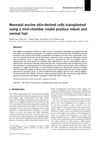 9 citations,
August 2013 in “Journal of Tissue Engineering and Regenerative Medicine”
9 citations,
August 2013 in “Journal of Tissue Engineering and Regenerative Medicine” Transplanted baby mouse skin cells grew normal hair using a new, efficient method.
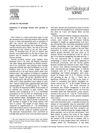 8 citations,
September 2003 in “Journal of dermatological science”
8 citations,
September 2003 in “Journal of dermatological science” Substance P helps hair grow longer and faster.
 7 citations,
June 2021 in “Amino acids”
7 citations,
June 2021 in “Amino acids” Human hair protein modifications could potentially indicate heart disease risk.
 5 citations,
September 2020 in “Journal of Cosmetic Dermatology”
5 citations,
September 2020 in “Journal of Cosmetic Dermatology” Dexpanthenol improves hair growth and satisfaction in women without side effects.
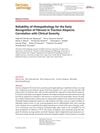 5 citations,
June 2019 in “Dermatopathology”
5 citations,
June 2019 in “Dermatopathology” Histopathology is not reliable for detecting early fibrosis in traction alopecia or for showing how severe it is.
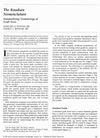 5 citations,
September 1997 in “Dermatologic Surgery”
5 citations,
September 1997 in “Dermatologic Surgery” Dr. Russell Knudsen's system classifies hair grafts by class, shape, and size for clearer communication in hair restoration surgery.
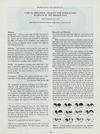 5 citations,
October 1993 in “International Journal of Dermatology”
5 citations,
October 1993 in “International Journal of Dermatology” Topical minoxidil is effective and safe for hair regrowth in Middle Eastern men with early baldness, with better results in younger patients and certain types of baldness.
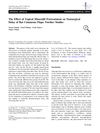 4 citations,
June 2013 in “Aesthetic Plastic Surgery”
4 citations,
June 2013 in “Aesthetic Plastic Surgery” Minoxidil improved rat skin flap survival but was less effective than surgical methods.
 2 citations,
November 2020 in “Fertility Research and Practice”
2 citations,
November 2020 in “Fertility Research and Practice” The survey helps identify menstrual irregularities and excess male hormones, aiming to detect conditions like Polycystic Ovary Syndrome.
 2 citations,
July 2009 in “Pharmacognosy Research”
2 citations,
July 2009 in “Pharmacognosy Research” A herbal mix with chickpea, holy basil, and nut grass extracts grew rat hair well, similar to a common hair growth drug.
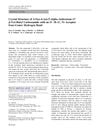 2 citations,
December 2008 in “Journal of Chemical Crystallography”
2 citations,
December 2008 in “Journal of Chemical Crystallography” The research shows that hydrogen bonds greatly affect the crystal structure of a Finasteride derivative.
 1 citations,
January 2017 in “Clinical approaches and procedures in cosmetic dermatology”
1 citations,
January 2017 in “Clinical approaches and procedures in cosmetic dermatology” Hair can't be reliably repaired once damaged; prevention and proper product use are key to maintaining hair health.
 1 citations,
January 2011 in “Springer eBooks”
1 citations,
January 2011 in “Springer eBooks” Histone demethylases play a key role in the development of many diseases and may be targets for treatment.
 1 citations,
January 2001 in “Dermatologic Surgery”
1 citations,
January 2001 in “Dermatologic Surgery” Pulsed dye laser and hydrogel dressings effectively treat hypertrophic scars.
 October 2024 in “Journal of the Endocrine Society”
October 2024 in “Journal of the Endocrine Society” Hirsutism in young girls can have causes other than PCOS, so diagnoses should be reassessed if treatments don't work.
 November 2023 in “Hair transplant forum international”
November 2023 in “Hair transplant forum international” Caffeine can stimulate hair growth, but the best dose and frequency for hair loss treatment are still unknown.
 September 2019 in “The journal of investigative dermatology/Journal of investigative dermatology”
September 2019 in “The journal of investigative dermatology/Journal of investigative dermatology” Not having enough cystatin M/E protein causes less hair growth and dry skin.

Pimpinella anisum L. extract significantly boosts hair growth in mice.
 January 2019 in “Springer eBooks”
January 2019 in “Springer eBooks” Transplanting skin cells is a safe, effective, and affordable treatment for vitiligo.
 January 2019 in “SAGE Open Medical Case Reports”
January 2019 in “SAGE Open Medical Case Reports” A scalp biopsy revealed systemic amyloidosis in a woman who initially seemed to have a common hair loss condition.






























